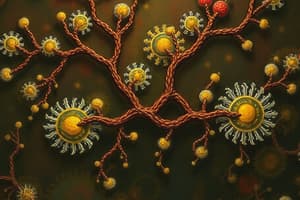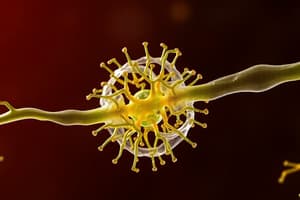Podcast
Questions and Answers
What is the chromosome number in human somatic cells?
What is the chromosome number in human somatic cells?
- 46 (correct)
- 92
- 23
- 48
What defines a haploid cell?
What defines a haploid cell?
- Having one set of chromosomes (correct)
- Having four sets of chromosomes
- Having no chromosomes
- Having two sets of chromosomes
Which part of the cell cycle primarily involves cell preparation for division?
Which part of the cell cycle primarily involves cell preparation for division?
- Interphase (correct)
- Mitosis
- Cytokinesis
- G1 phase
What are sister chromatids?
What are sister chromatids?
What occurs during the cell cycle after DNA replication?
What occurs during the cell cycle after DNA replication?
What do homologous chromosomes represent?
What do homologous chromosomes represent?
How many chromosomes are found in human gamete cells?
How many chromosomes are found in human gamete cells?
Which molecules maintain the structure of chromosomes?
Which molecules maintain the structure of chromosomes?
What primarily determines the sequence of amino acids in a polypeptide?
What primarily determines the sequence of amino acids in a polypeptide?
What is the primary purpose of mitosis?
What is the primary purpose of mitosis?
Why are human beings considered diploid organisms?
Why are human beings considered diploid organisms?
What leads to the formation of nonsense codons during transcription?
What leads to the formation of nonsense codons during transcription?
What structure joins the two chromatids in a chromosome?
What structure joins the two chromatids in a chromosome?
Which of the following processes is associated with gamete formation?
Which of the following processes is associated with gamete formation?
What is the continuity of life primarily based on?
What is the continuity of life primarily based on?
What is contained within each chromatid that determines the characteristics of organisms?
What is contained within each chromatid that determines the characteristics of organisms?
Flashcards are hidden until you start studying
Study Notes
Polypeptide Assembly and Genetic Information
- Cistron length determines mRNA codon count, influencing the number of amino acids in a polypeptide.
- DNA's triplet code specifies the amino acid sequence, thus controlling polypeptide type.
- Nonsense codons form during transcription, signaling the termination of polypeptide synthesis.
Cell Division Fundamentals
- All cells arise from pre-existing cells through the process of cell division, essential for life continuity.
- Unicellular organisms, like amoeba, reproduce via division, creating two identical offspring.
- Mitosis facilitates growth through cell multiplication, while meiosis is crucial for gamete formation in sexual reproduction.
Chromosomal Structure and Function
- Chromosomes, composed of DNA and histone proteins, exist in pairs within the nucleus, with a species-specific chromosome count.
- Humans possess 23 pairs (46 total), classifying them as diploid organisms (2n), inheriting one chromosome set from each parent.
- Somatic cells contain 46 chromosomes, while gametes are haploid (n), possessing only one set (23 chromosomes).
- Each chromosome comprises chromatids linked at the centromere, with genes acting as functional units that determine organism traits.
Key Terminology in Cell Division
- The cell cycle represents the sequence of events between cell divisions, encompassing the preparation and division phases.
- Sister chromatids are pairs of chromatids within the same chromosome, while non-sister chromatids exist on different ones.
- Homologous chromosomes originate from different parents during fertilization, sharing structural similarities.
The Cell Cycle Stages
- The life cycle of a cell includes interphase for preparation, followed by nuclear division during mitosis.
- During the cell cycle, DNA is duplicated and allocated to opposite poles, culminating in the formation of identical daughter cells.
Studying That Suits You
Use AI to generate personalized quizzes and flashcards to suit your learning preferences.





